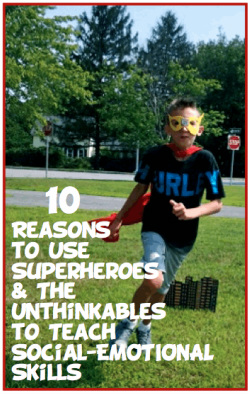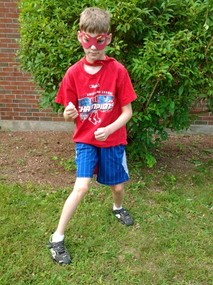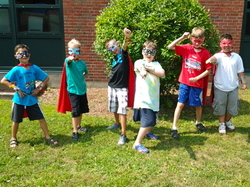10 Reasons You Should Use Superheroes and the Unthinkables to Teach Social- Emotional Skills8/11/2014  Did you know that the Caped Crusader made his first appearance 75 years ago this summer? If he was 25 when he started fighting crime, that would make him older than I am! Holy colonoscopy, Batman! There are lots of superheroes who've been around long enough to collect Social Security. Yet there’s no denying---especially if you’ve turned on a television or spent more than five minutes on Pinterest---that their appeal is as strong as ever (which, sadly, is more than can be said of me). Using superheroes as a way to connect with clients in counseling is certainly not a new idea. I’ve done it off and on, here and there, since the early 90’s, and I’m sure lots of clinicians were using them long before that. But recently when I was creating a superhero-themed “social language” summer school program for ten elementary-aged students, I started to think more consciously about the reasons why superheroes are so effective as a counseling tool, especially with children. There are a lot.  1. Superheroes have POWER. Most of the time a superhero looks like a perfectly average person, but that appearance is deceiving. Even those whose alter egos are from traditionally disenfranchised groups like minorities, women, or dorky teens end up acquiring great power (see Cyborg, Wonder Woman, and Spider Man). Kids by definition have virtually no control over anything, so they identify with those characters and root for them in a big way. 2. Superheroes lead exciting lives. Flying through the air, leaping from rooftop to rooftop, crawling up the sides of skyscrapers, and driving really fast are all a heck of a lot more interesting than going to school, feeding the cat, and going to bed at 8:30. Trust me, I should know. 3. Superheroes overcome major life challenges. The backstories of many superheroes often include a tremendous loss, a traumatic history, or a serious character flaw. Bruce Banner has a teensy anger management issue. Bruce Wayne and Peter Parker's parent figures are murdered. Yet heroes don't allow adversity to define or limit them; in fact sometimes these challenges are what drive them to achieve greatness. 4. Superheroes can fight back. Sure, they have vulnerabilities---some significant---but they also always have at least one major strength that helps them fight or stand up to their enemies. Kids will buy in to the idea that they have a special power too, making it part of our job to help them figure out what it is and how to use it. 5. Superheroes often have a dual identity or a secret self, which can foster feelings of loneliness or of not fitting in. Dude, who doesn't? I think we can all relate. 6. Superheroes almost always win in the end. Even when things spiral out of control and our hero appears doomed, we don’t completely give up hope. We may clap our hands over our eyes for a moment, but some tiny piece of us remains confident that our hero will triumph. The whole exercise fosters resilience and optimism, two traits we wholeheartedly try to grow in our kids. 7. Superheroes can be a way of connecting with others. They've been around for so long and have such a broad appeal that people of all ages and backgrounds, or who have a fraught history with each other, can use them to find common ground. 8. Superheroes get to wear capes. ‘Nuff said. That was eight solid therapeutic reasons to go with a superhero theme for my social language program. But engaging the kids was only part of my goal. I also wanted a way to teach skills within the superhero framework. I turned to Michelle Garcia Winner’s Superflex: A Superhero Social Thinking Curriculum, a resource I used during the school year. Her Social Thinking theory involves working with students to help them try and understand others’ actions, intentions, and feelings so they can adjust their own behavior accordingly. What I like best about the Superflex curriculum is the cast of “Unthinkables:” dastardly foes who get into people’s brains and make them (for example) only think about their own plans, get stuck on their ideas, or have huge upset reactions. The Unthinkables were a perfect addition to my Superhero Training Academy. 9. The Unthinkables are easy for kids to accept and understand as part of the superhero narrative. Every superhero has his nemesis, and each nemesis has his own special method of causing trouble, just like the Unthinkables. In Superhero Training Academy, our daily “B.O.L.O. (Be On the Lookout) Briefings” on the Unthinkables were a crucial part of the day. My friends took the acquisition of this information very seriously. They wanted to know what to look for and what special powers or strategies would defeat each Unthinkable we met. 10. Unthinkables allow children to separate the "unexpected" behavior from their own sense of self. When we tell kids their behavior is "unacceptable" or they're "making a bad choice," they hear, "You're unacceptable" or "you're bad." But when the adult and the child are working together to recognize and defeat an Unthinkable, the child herself is part of the team, not the cause of the problem. This is a subtle difference, but don’t underestimate the power of the message, "You’re not a 'bad kid,' you’re one of the good guys. You're just temporarily under the influence of one of those sneaky Unthinkables. " If there's not an existing Unthinkable for a social-emotional issue you'd like to address, you can customize one. For example, to correlate with the Zones of Regulation concept of Size of the Problem, I created "Magnifying Man," an Unthinkable who makes even very small problems appear large. Dispelling feelings of powerlessness, hopelessness, and self-blame: those are the amazing therapeutic powers of superheroes and the Unthinkables.  Read more about the Summer Social Superhero Squad p.s. I've dedicated a whole page to giving you some ideas, activities, and printables. It's still a work-in-progress, so keep checking back for updates. Enjoy!
3 Comments
8/11/2014 01:09:55 am
Huzzah! That was perfectly poignant and masterfully scripted. YOU are undoubtedly a SUPERHERO of the Character Kind! Thank you for sharing your insightful reflections. Shared on FB and Pinned!
Reply
Leave a Reply. |
Author
|

 RSS Feed
RSS Feed